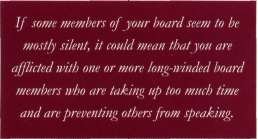 |
Home | Search | Browse | About IPO | Staff | Links |
 |
Home | Search | Browse | About IPO | Staff | Links |
GET ON BOARDQ & A - The 'Board Doctor' Is In
What does the president of the board do when discussions are bogged down and the board has reached a stalemate?If the board is stuck on a topic, consider whether you are really talking about multiple issues related to that topic. The president should take control of the discussion (or jump into the long, uncomfortable silence) and summarize the points that everybody agrees on. Then, list the other issues -- the other aspects of the stalemated topic -- that you still need to discuss. Deal with the easier issues first. That will allow you to show some quick progress, which should get board members involved and motivated.  When board members start veering off track, how can the president politely get the board back on task?
topic. It seems we've gotten away from our agenda. So we are talking about an issue that may be outside the scope of this meeting. Unless you can show me how this topic is relevant and important to pursue now, let's table discussion on this issue for another meeting and get back to our agenda." A couple of our board members seem shy. How can we encourage them to participate more?Very rarely have I met a board member -- especially an elected board member -- who is genuinely shy or largely devoid of ideas. If some members of your board seem to be mostly silent, it could mean that you are afflicted with one or more long-winded board members who are taking up too much time and are preventing others from speaking. A board president can encourage participation from quiet members first by politely shutting down the member who dominates the floor and then by specifically inviting a short comment from a board member who hasn't seized an opportunity to speak. The president might say, "Bob, our time is flying here, can you please wrap this up?" If the rambler does not quit, then the president can stop him short with a direct statement: "Bob, thanks very much. We need to move on. Sue, you're next." That's a last resort, of course, but board members who go on and on despite polite suggestions to yield need to learn to be succinct and share the floor. When is a board derelict in duties?Usually there's a lot of axe grinding behind this question, which invariably comes to me either from a board member who has come out on the short end of a vote or a concerned citizen who doesn't like the agency's priorities. A board can -- especially in the eyes of a minority opinion holder -- make an occasional 'bad' choice or even a slew of 'bad' policy decisions. That doesn't mean the board is derelict in its duties. In my opinion, a board is derelict when: 1. It fails to prevent conflict of interests. 2. It allows unethical actions, such as using the agency as a job placement service for relatives. 3. It violates the Open Meetings Act. 4. It micromanages. Under certain circumstances, should the board meet without the executive director?In my opinion, the board should never meet without the executive director present. That's true -- perhaps especially true -- even for closed session meetings during which the board considers terminating the executive's employment with the agency. Closed meetings without the executive demonstrate a lack of trust. Sessions without the executive aren't truly effective and simply aren't fair because the executive is unable to explain or defend his or her actions and decisions. Public meetings without the director can be downright detrimental to the agency. The executive is the board's professional resource and part of the policymaking team. A board that meets without the executive is choosing to deny itself immediate access to expertise in the field while it sets policy. That's practically a recipe for making bad decisions. Should park district, forest preserve, conservation and recreation agency executives create blogs?A Web log, or a blog, is a Web site that allows the user to post his or her views and opinions on topics and to receive comments from blog readers on the issues covered on the site. Creating a blog might be a way to start a conversation about an agency's issues among community residents. It might also be a good way to solicit citizen input for the executive and the board. An agency executive who blogs can (at least initially) shape the community's conversation on agency issues. To blog well is to control the news. Instead of having the media shape the news about his or her agency, blogging gives the executive the opportunity to get the agency's point of view out to the public. IAPD CalendarJanuary 25-27, 2007 April 1 -30 May 1 May 1 May 2 May 15 June 12 August 18 August 27 September 14 |
|
|